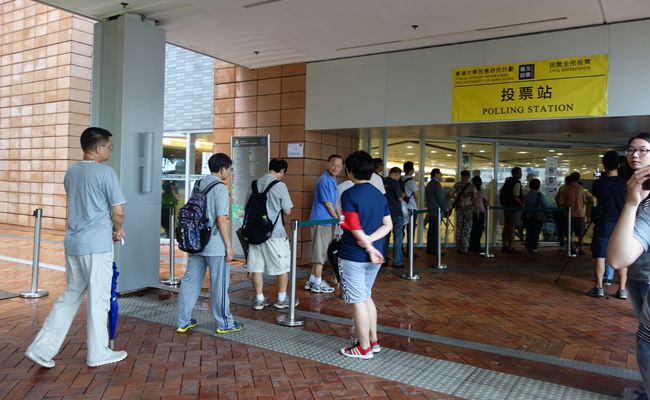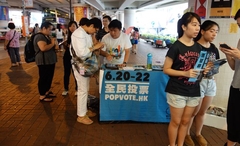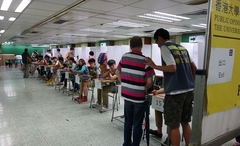Authorities condemn HK 'referendum' as 'invalid and illegal'
| Editor’s Note |
Authorities condemned as "invalid and illegal" an unofficial "referendum" on electoral reform in Hong Kong Special Administrative Region (SAR).
The referendum, organized by the Occupy Central movement and run by the Public Opinion Program under the University of Hong Kong (HKU), kicked off its online voting on June 20 and will conclude on June 29.
The referendum asked voters to choose from three shortlists, all of which suggest that any electoral plan of the chief executive should start with public nominations instead of Beijing's plan for the nominating committee.
The online voting started on June 20 and poll booths opened on June 22.
| Latest News |
All 511 protesters detained by police during a sit-in in Hong Kong’s Central commercial district earlier July 2 were released before midnight.
HK rally will not alter govt stance: officialHundreds of thousands of Hong Kong residents took to the streets on July 1 in an annual “pro-democracy” rally while authorities celebrated the 17th anniversary of the region’s return to China.
Concerns rise as HK groups plan to block financial zoneActivists in the Hong Kong Special Administrative Region (SAR) plan to occupy parts of the city’s financial district on July 1 in their appeal for a public nomination process for the city’s top post, amid warnings and concerns that the move may spin put of control.
HK ‘poll’ results unveiledAn unofficial “referendum” that polled Hong Kong residents on the electoral method to be used to select the city’s next chief executive, which was slammed by the authorities as “lacking constitutional grounds,” ended on the night of June 29, as both sides waited for comments from the government before making their next move.
60% mainlanders oppose referendum: surveyA Global Times poll has revealed that the majority of residents of the Chinese mainland have no idea that there is an ongoing unofficial referendum and planned Occupy Central movement in Hong Kong, and more than 60 percent opposed these two activities after being informed.
| Viewpoints |
Global Times
Confrontation won’t force compromise in Hong Kong
Dealing with these protests cannot be done at the cost of enlarging the gap between the mainland and Hong Kong. The central government doesn't have to have high expectations of Hong Kong society's satisfaction rate, and more tenacity is needed in the face of these protests.
HK people’s best interests not represented in farcical ‘referendum’
The Chinese mainland and Hong Kong have seen rising tensions between each other in recent years. They are in a complicated phase in which more problems will emerge as ties grow closer. These problems do not foretell the dead end of the "one country, two systems" framework. Both sides are still in an early stage, and more common ground will be found in the future.
Editorial:
Pushing confrontation not in HK’s interest
The mainland is willing to see that Hong Kong retains its own political system. If any Hongkongers insist that the central government is aiming to crack down on freedom of speech and democracy, and that only protests can safeguard Hong Kong's future, they should get rid of such a mentality.
Radical opposition is splitting Hong Kong
Hong Kong opposition groups have become enamored with illegal confrontations in a society governed by law. They are sparing no efforts to convert more and more Hongkongers to their cause to rival the Hong Kong Special Administrative Region's government and the central government. They have put on various postures to this end, including the electronic ballot on reform plans for the 2017 chief executive election. Though apparently fabricated, the figures displayed by the poll are described as something holy by these radical members, who only seek immediate political effects to obtain a bargaining chip to confront Beijing.
Ludicrous to let online poll decide HK fate
Hong Kong's opposition groups will find their efforts to convince most of the electorate to be in vain. Even if they can deceive more than half of Hongkongers, Beijing will never compromise on sovereignty-related issues.
The referendum is actually a game where the opposition groups are too deep in their illusion. They should be sober-minded and realize that they are ineligible to object to the Basic Law.
HK ‘referendum’ illegal and useless
If the activists really move ahead with Occupy Central and disable the financial center of Hong Kong, the local residents and business people will disagree and will welcome the central government's action to restore order.
● Zhu Shihai, a professor of Hong Kong studies at the Beijing-based Central Institute of Socialism:
“Though the public nomination method is a democratic method, it is not in line with the Basic Law and the Hong Kong government will undoubtedly maintain the rule of law and also social stability and it is capable of that.”
● Fung Ka-pun, one convener of Silent Majority of Hong Kong:
Fung said most Hong Kong people would not go for the Occupy Central movement, because what most people are concerned about is that every Hongkonger has a vote in the chief executive election and that will be realized in 2017.
● Michael Tien Puk-sun, the city's legislator and deputy chairman of New People's Party:
"The majority of the Hong Kong public support the [central] government's proposal about electing the city's chief through a nomination committee, as achieving universal suffrage is their common goal."
● Priscilla Lau Pui-king, a Hong Kong deputy to the National People's Congress (NPC):
Priscilla Lau Pui-king said resistance only comes from a minority incited by irrational teenagers. Most Hong Kongers are against the Occupy Central movement.
| Response |
● The Hong Kong and Macao Affairs Office of the State Council said in a statement that the election methods proposed are not in line with the universal suffrage method determined by the Basic Law of the Hong Kong Special Administrative Region (SAR) and the National People's Congress Standing Committee.
● A representative of China's Ministry of Foreign Affairs in Hong Kong declared on June 19 it strongly opposes intervention over Hong Kong matters by foreign forces, as well as collusion with external powers.
● A spokesman with the Liaison Office of the Central People's Government in the Hong Kong Special Administrative Region (HKSAR) said on June 20 that any attempt to press the central government with so-called "civil disobedience movement" to make concessions on bottom line issues would fail.
● The SAR government on June 20 also said the so-called "civil referendum" has no legal effect, after repeatedly pointing out that according to Article 45 of the Basic Law, the power to nominate chief executive candidates is vested in the nominating committee only.
● Hong Kong Chief Executive Leung Chun-ying said on June 21 there was no legal foundation for the referendum.
● Yuen Kwok-keung, the SAR's secretary for justice said "What must be pointed out is that a 'referendum' is a constitutional arrangement. Hong Kong is not a state and has no right to create a 'referendum.' Occupy Central movement's proposal has attempted to make Hong Kong's political system equivalent to that of a state and exposed its nature of favoring the 'independence of Hong Kong,' which is both illegal and unconstitutional."
Yuen said on June 22 the government respects residents' right to voice their opinions, but must act under the rule of law. He said political reform will not deviate from the Basic Law and the decision of the National People's Congress, reported RTHK.
| Photos |
| Related Reports |





